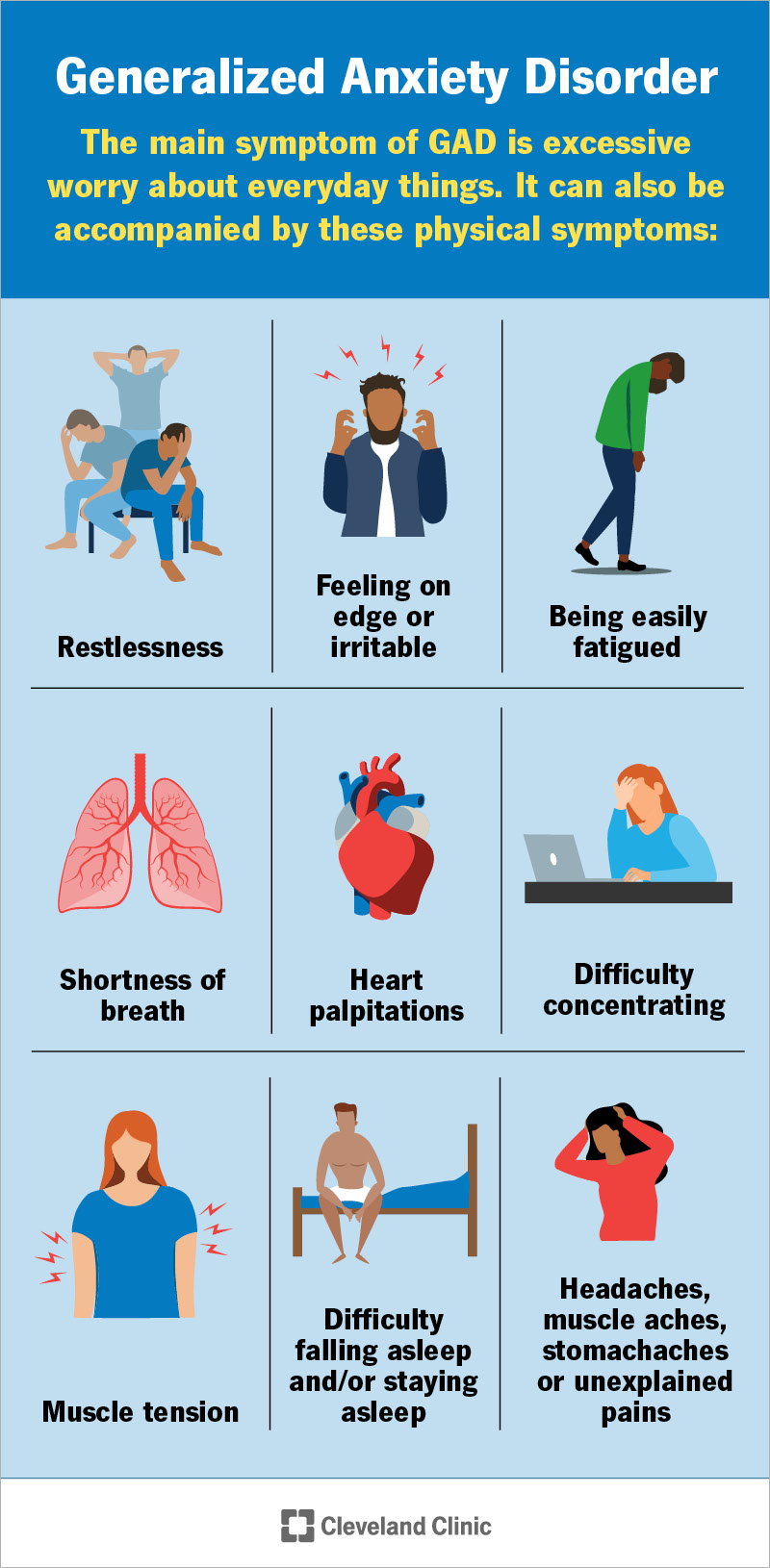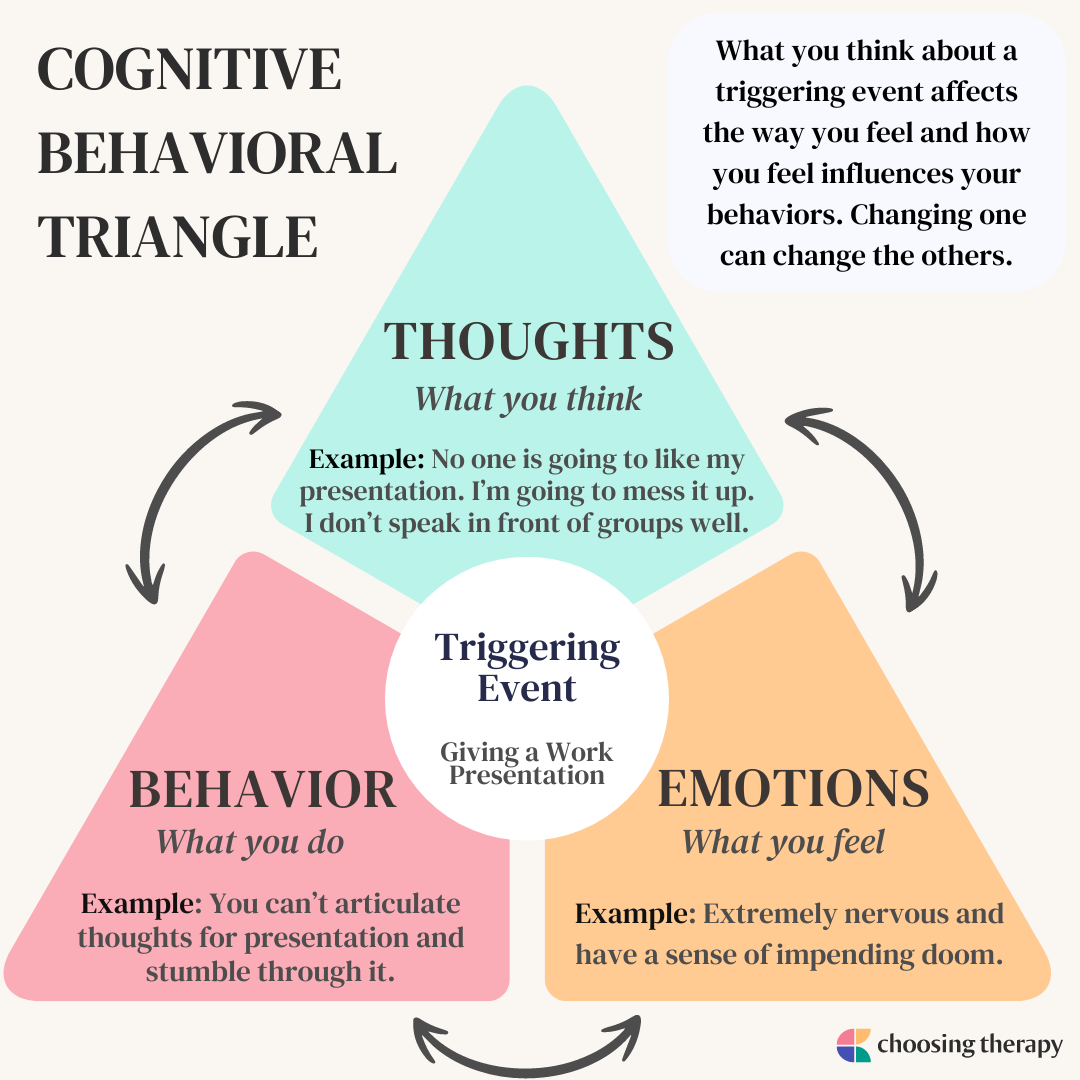Reclaim your mental well-being through proven therapy for anxiety
Reclaim your mental well-being through proven therapy for anxiety
Blog Article
Exploring Different Techniques in Therapy for Stress And Anxiety Condition for Lasting Modification
When dealing with stress and anxiety problems, it's important to check out a selection of therapy techniques. Each method offers distinct understandings and tools to help you manage your signs and symptoms successfully. You could find that combining methods can yield the very best results. Comprehending the subtleties of these approaches is key to promoting long-term change. What if the best combination could release a brand-new degree of psychological health for you?
Comprehending Anxiousness Conditions: A Short Summary
Stress and anxiety disorders, which influence countless people worldwide, can significantly affect daily life. You might experience frustrating feelings of worry or worry that appear uncontrollable. These feelings can result in physical symptoms like an auto racing heart, sweating, or perhaps wooziness. Common types of anxiety conditions include generalised anxiety disorder, panic disorder, and social anxiousness condition. Each has distinct signs, yet they all share a tendency to disrupt your routine and relationships.Understanding the source of your stress and anxiety is vital. It might stem from genetics, brain chemistry, or life experiences. Acknowledging your triggers can help you handle your reactions much better. It is necessary to keep in mind that you're not alone in this struggle. Many people encounter similar difficulties, and looking for help is a solid action toward sensation much better. By finding out about anxiousness problems, you're currently on the path to understanding and managing your problem a lot more successfully.
Cognitive-Behavioral Treatment: Testing Unfavorable Thought Patterns

Determining Adverse Thought Triggers
Identifying the particular triggers behind your unfavorable ideas can be vital in handling anxiousness when you come across moments of distress. Begin by focusing on scenarios that prompt feelings of worry or fear. Is it a jampacked space, a forthcoming due date, or a discussion with particular people? Jot down these circumstances in a journal. This will aid you determine patterns in your thinking. Notice physical sensations that accompany your negative ideas, like an auto racing heart or tightness in your chest. By identifying these triggers, you acquire insight right into what's sustaining your stress and anxiety. Recognizing these links is the very first step in challenging those thoughts and eventually reclaiming control over your psychological feedbacks.

Changing Thoughts With Positives
Challenging unfavorable idea patterns is a vital action in changing your state of mind and decreasing anxiety. You may commonly locate on your own caught in cycles of self-doubt or tragic thinking. Rather than letting these thoughts determine your sensations, technique changing them with favorable affirmations or realistic alternatives. As an example, when you assume, "I can not handle this," move it to, "I can take care of difficulties one action at once (Counseling services for anxiety)." This basic adjustment can significantly affect your mood. Frequently determining and responding to these unfavorable ideas helps produce a healthier internal dialogue. Remember, it takes time and effort, but continually exercising this method can bring about lasting modification, encouraging you to encounter anxiousness with renewed confidence and resilience
Structure Coping Methods Together
Replacing adverse thoughts is just the beginning of taking care of anxiousness properly. To create lasting change, you need to build coping strategies that equip you. Cognitive-Behavioral Therapy (CBT) assists you recognize and test those unhelpful idea patterns. With each other, you and your counselor can explore exactly how these thoughts influence your sensations and behaviors.Start by creating functional methods, like journaling or mindfulness workouts, that allow you to challenge anxiety head-on. When you encounter your worries slowly, you'll discover to respond differently.

Mindfulness and Acceptance-Based Approaches: Growing Present-Moment Understanding
As you navigate the complexities of anxiousness, incorporating mindfulness and acceptance-based strategies can considerably boost your capability to cultivate present-moment recognition. By concentrating on the present moment, you'll find that you can observe your ideas and sensations without judgment. This technique helps you recognize your anxiousness without feeling bewildered by it.Engaging in mindfulness exercises, such as deep breathing, body scans, or led meditations, permits you to ground yourself in your existing experience. Acceptance-based strategies urge you to accept your feelings rather than fight versus them. When you accept your sensations, they lose their power over you.Incorporating these methods right into your daily routine can transform how you react to anxiousness. You'll develop resilience and learn to browse difficult circumstances with higher convenience. Inevitably, growing present-moment understanding lays the structure for lasting change, equipping you to lead a more satisfying life.
Direct Exposure Therapy: Challenging Anxieties Gradually
Exposure therapy assists you confront your anxieties in a steady way, making it less overwhelming. You'll find out techniques to deal with anxiety-provoking circumstances action by action, while additionally building coping techniques to manage your responses. This approach empowers you to take control and reduce stress and anxiety over time.
Gradual Direct Exposure Strategies
When facing anxiety, gradually facing your fears can be an effective means to gain back control. This method, recognized as steady exposure, entails gradually exposing on your own to the situations or objects that trigger your anxiousness. Beginning with much less challenging situations and progressively work your method as much as more difficult ones. For circumstances, if you hesitate of public speaking, you might begin by talking in front of a mirror, then advance to sharing thoughts with a good friend, and at some point attend to a small group. Each step helps desensitize you to the fear, constructing your self-confidence gradually. Bear in mind, it's important to rate on your own and celebrate small triumphes as you relocate via this procedure, strengthening your capacity to manage anxiety successfully.
Building Coping Approaches
Building efficient coping techniques is vital for handling anxiousness, particularly as you confront your worries gradually. One powerful technique is exposure treatment, where you begin by encountering your concerns in a controlled way. Begin with much less intimidating scenarios and slowly work your means as much as even more tough situations. This gradual direct exposure aids desensitize you to anxiousness causes, making them less overwhelming.Incorporate leisure strategies, such as deep breathing or mindfulness, to calm your mind during direct exposure. Track your progress, commemorating tiny victories in the process to boost your self-confidence. Keep in mind, it's all right to take your time; the goal isn't perfection but constant improvement. By building these techniques, you'll encourage yourself to navigate stress and anxiety and welcome life more completely.
Psychodynamic Treatment: Uncovering Origin of Anxiety
Psychodynamic therapy checks out the subconscious mind, revealing the origin creates of your anxiousness - Counseling services for anxiety. By analyzing your ideas, feelings, and previous experiences, this strategy helps you uncover underlying conflicts and unresolved problems that may add to your existing anxiousness. You'll collaborate with a specialist to check out youth experiences, partnerships, and emotional patterns that shape your reactions today.As you get understanding into these deeper layers of your mind, you'll start to recognize exactly how previous occasions affect your existing habits. This understanding can result in catharsis, enabling you to refine emotions you might have suppressed.Through the therapeutic connection, you can also identify defense reaction that might have created with time, providing a clearer course to alter. Eventually, psychodynamic therapy equips you with the tools to address your anxiety at its core, advertising long-term transformation in your psychological well-being
Integrative and Holistic Techniques: Integrating Methods for Greater Efficacy
Integrating various healing methods can enhance your journey toward taking care of stress and anxiety a lot more properly. By incorporating aspects from cognitive-behavioral therapy, mindfulness techniques, and alternative methods, you can create an individualized method that addresses your unique needs. For instance, you could utilize cognitive-behavioral strategies to test unfavorable thought patterns while integrating mindfulness exercises to ground yourself in the here and now moment.Additionally, discovering all natural techniques such as yoga exercise or reflection can advertise relaxation and reduce anxiety signs and symptoms. This blend allows you to create better self-awareness and resilience.Experimenting with these varied techniques can aid you discover what reverberates most with you. Remember, it has to do with discovering a synergy that functions, instead of staying with a single technique. This integrative approach not just provides immediate relief but likewise promotes lasting abilities for taking care of anxiousness, encouraging you to reclaim control over your life.
The Function of Support Equipments: Structure Strength With Link
While it might seem that handling anxiousness is a solitary journey, having a strong assistance system can play an essential role in your resilience. Bordering yourself with compassionate good friends, family members, or support system creates a secure area where you can freely share your feelings and experiences. You advise on your own that you're not alone in this struggle.These connections offer motivation and can offer functional coping methods that have actually worked for others when you connect with others. It's likewise a possibility to acquire point of view; buddies can aid you see scenarios in a different way, minimizing sensations of isolation.Moreover, emotional support promotes a feeling of belonging, which can greatly alleviate anxiety signs and symptoms. By leaning on your support group, you can construct strength and tackle difficulties a lot more effectively. Bear in mind, connecting for assistance signifies toughness, and it can make all the distinction in your journey towards taking care of anxiousness.
Often Asked Concerns
What Are the Usual Signs of Anxiety Disorders?
You may experience restlessness, fatigue, problem concentrating, impatience, muscle mass stress, and sleep disturbances. Physical signs can consist of rapid heart beat, sweating, and trembling. Acknowledging these signs early can help you seek appropriate assistance and therapy.

For How Long Does Therapy Generally Last for Anxiety Disorders?
Treatment for anxiety conditions typically lasts anywhere from a few weeks to numerous months. It truly relies on your private requirements, progress, and the methods your specialist makes use of to assist you handle your anxiousness properly.
Can Medication Be Made Use Of Along With Treatment for Stress and anxiety?
Yes, medication can definitely be utilized along with treatment for stress and anxiety. Incorporating both methods frequently enhances treatment efficiency, aiding you take care of signs and symptoms while exploring underlying concerns with therapy. Constantly consult your doctor for individualized suggestions.
Exist Self-Help Methods for Taking Care Of Stress And Anxiety?
Yes, there are a number of self-help approaches for taking care of anxiousness. You can practice mindfulness, engage in normal exercise, keep a well balanced diet regimen, establish a regular, and make use of deep breathing methods to assist minimize stress and anxiety signs successfully.
Just how Do I Know if I Required Specialist Help for Stress And Anxiety?
You ought to think about seeking specialist aid for anxiousness if it interferes with every day life, causes considerable distress, or if self-help methods aren't functioning. Trust fund your impulses; getting to out can bring about far better coping skills and support. Usual types of anxiousness problems include generalised anxiousness condition, panic disorder, and social stress and anxiety disorder. When you encounter moments of distress, recognizing the specific here triggers behind your unfavorable ideas can be vital in handling stress and anxiety. Replacing unfavorable thoughts is only the start of managing anxiety successfully. By examining your ideas, sensations, and past experiences, this strategy helps you uncover underlying disputes and unsettled issues that may contribute to your current stress and anxiety. It's also a possibility to gain point of view; pals can aid you see circumstances differently, minimizing sensations of isolation (Counseling services for anxiety).Moreover, psychological support promotes a sense of belonging, which can substantially reduce stress and anxiety signs and symptoms
Report this page